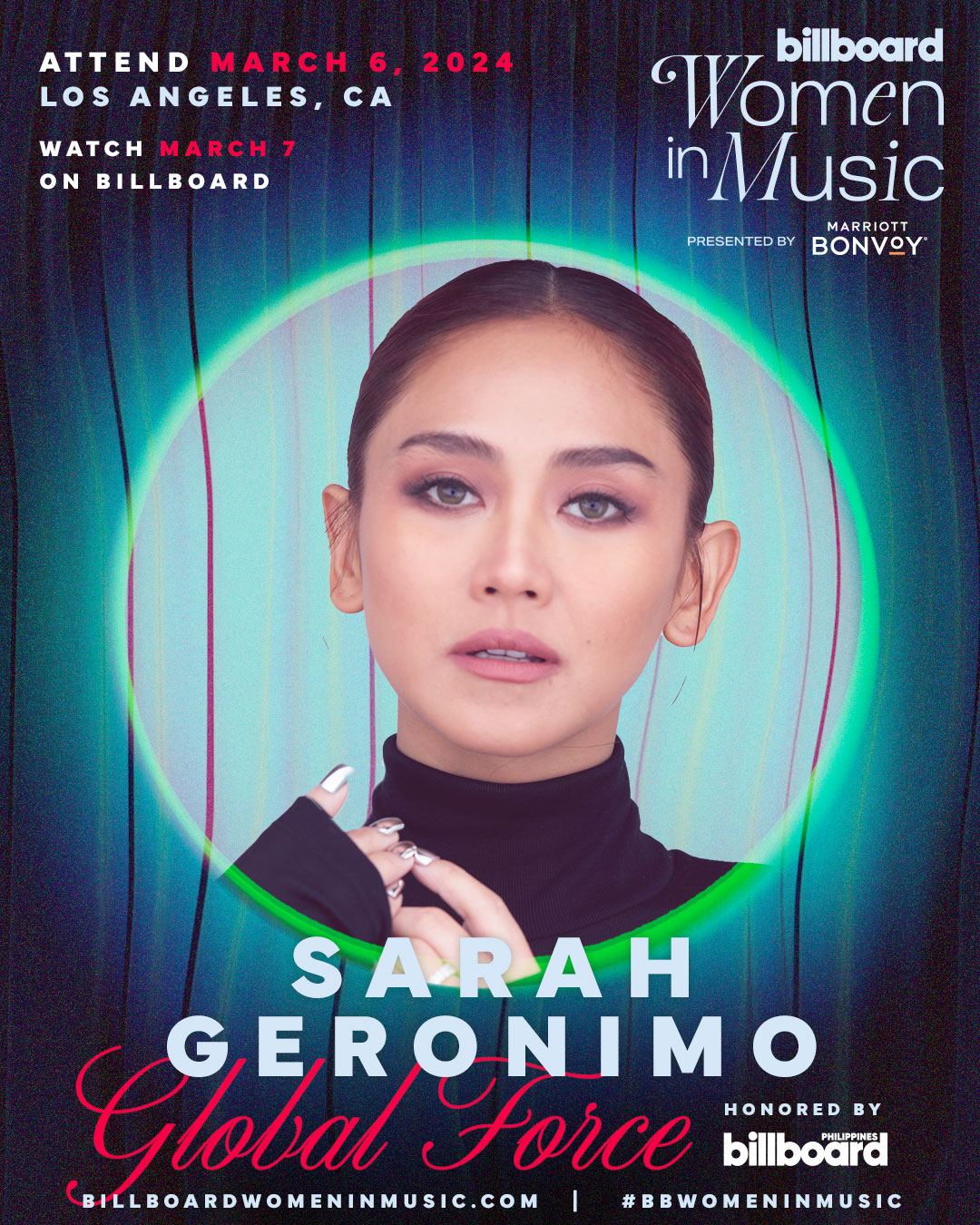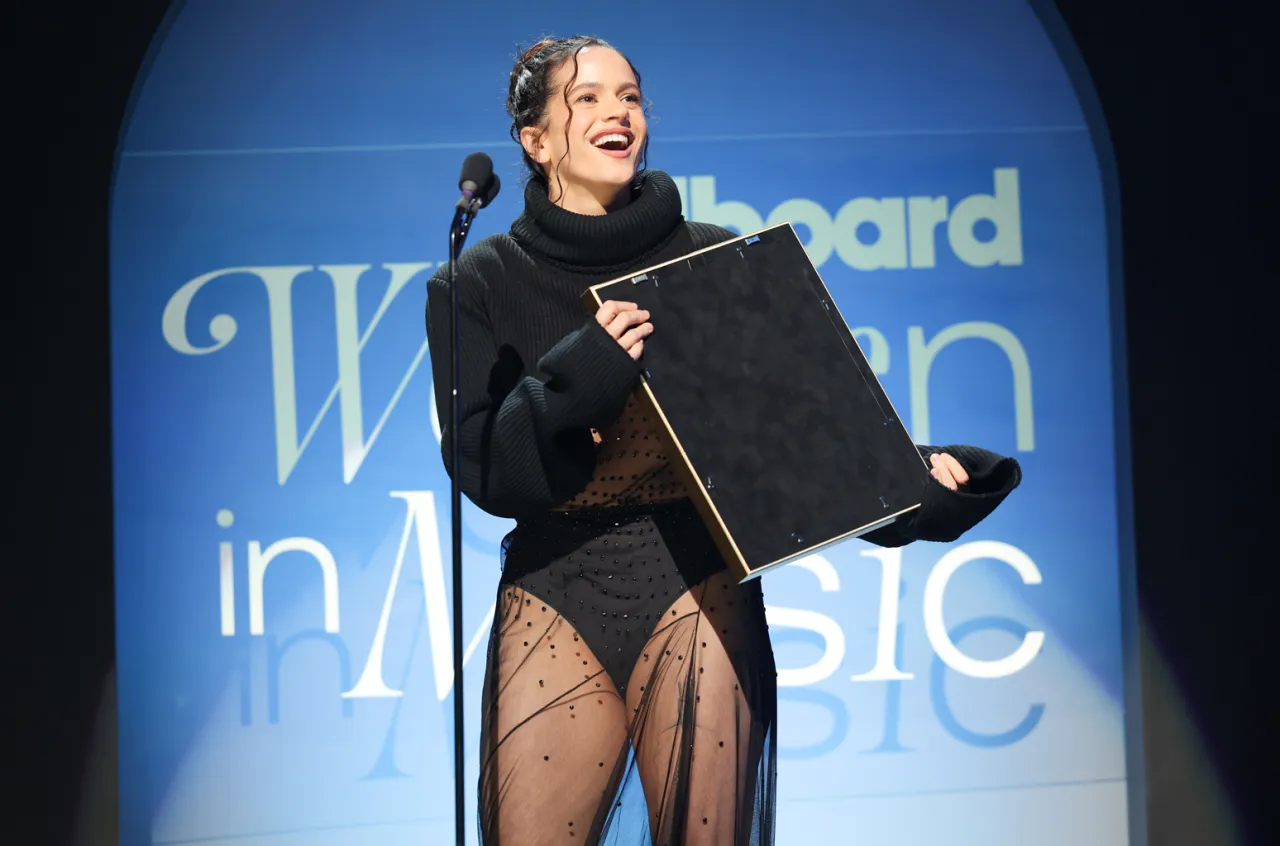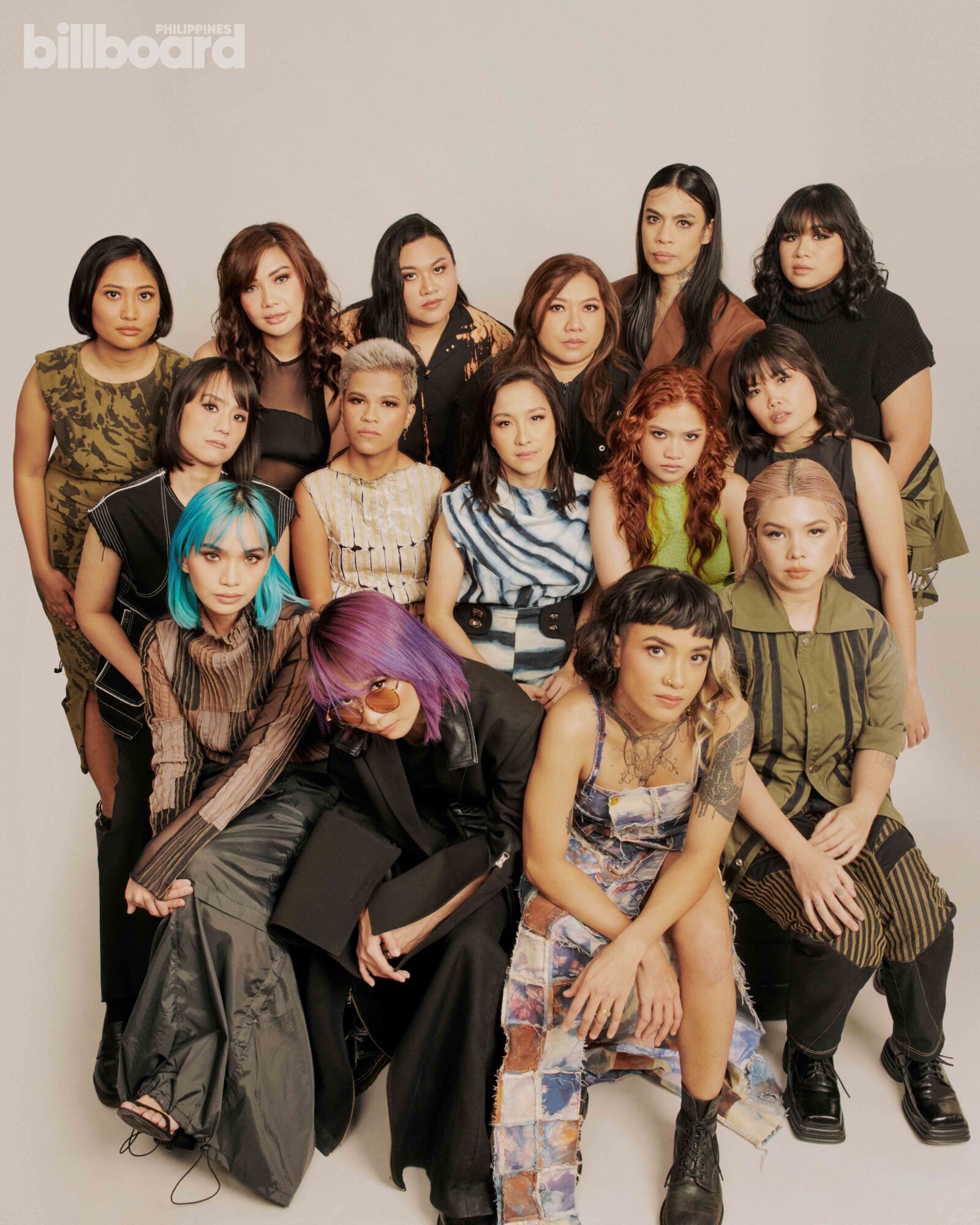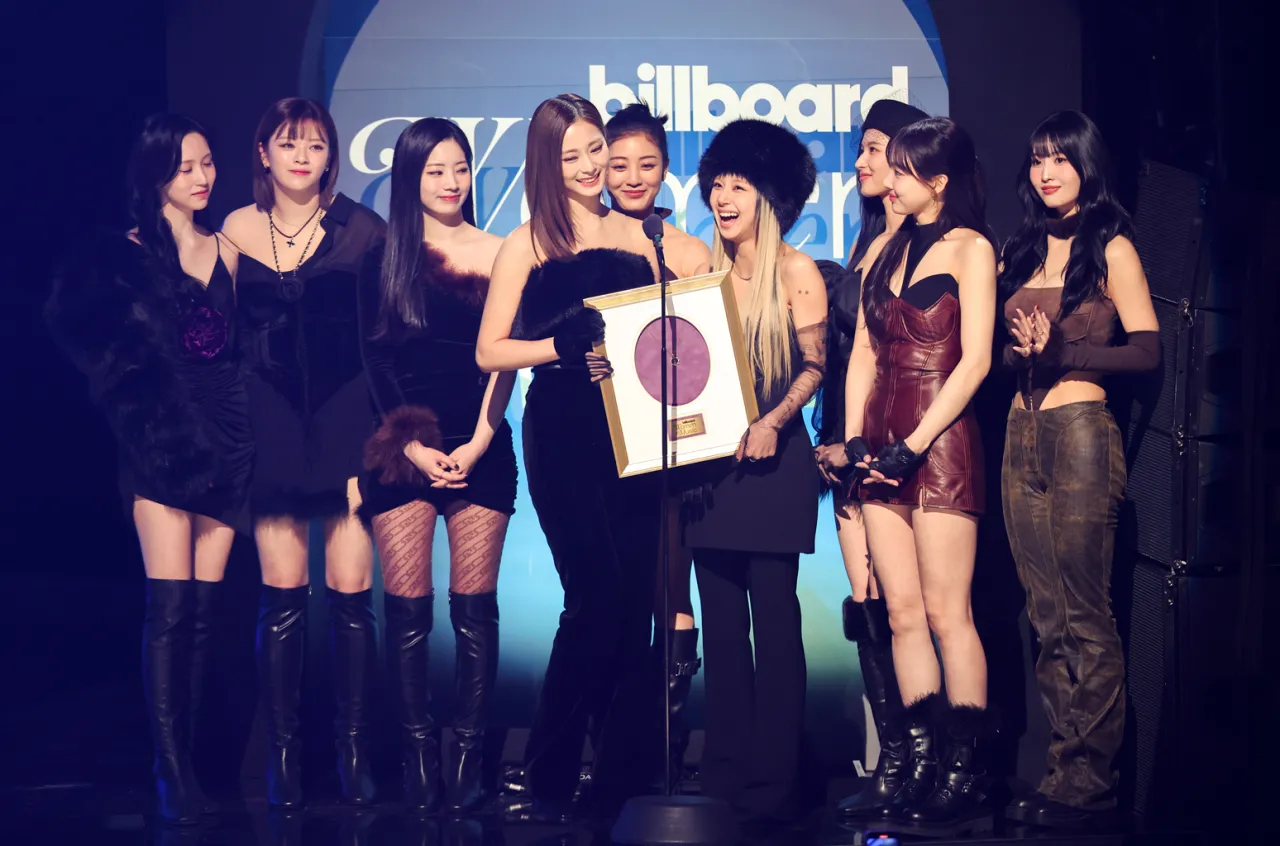Over the weekend, on February 24, Sarah Geronimo was chosen by Billboard Philippines to received the Global Force award at the 2024 edition of the Billboard Women in Music Awards in Los Angeles, California. It’s an unprecedented announcement, with Sarah Geronimo being the first ever born-and-raised Filipina to ever be recognized at the annual event. Not only that, this year marks the first year the Global Force award was introduced during the Women in Music Awards, making her, Brazilian singer-songwriter Luísa Sonza, and Italian pop icon Annalisa as the inaugural honorees of the award.
The Billboard Women in Music Awards were created in 2007, with the goal of “recognizing extraordinary women in the music industry who have made significant contributions to the business and who, through their hard work and continued success, inspire generations of women to take on increasing responsibilities within the field.”

Over time, similar women-centric awards have propped up all over the world. There’s the Australian Women in Music Awards, which was established in 2018, and aimed to “address the chronic gender inequality across the full spectrum of the Australian Music Industry.”
It’s evident that across the global music industry, music institutions are exploring what the holistic recognition of women in music could look like. Studies conducted over different genres have concluded that women still face discrimination, misogyny, and exclusion from the genre’s community at large.
For example, Erin L. Wehr’s study on the experiences of women in jazz reported that despite there being no differences between female and male musicians in terms of performance, socio-psychological variables like confidence, anxiety, attitude; social persuasions including perception of social climate and peer social support; as well as motivational processes like skepticism and self-efficacy emerged as additional issues that contribute to withdrawing from jazz study.
With this in mind, the question remains: what would a women-centric awards ceremony look like in the Philippines, and how would this impact the music industry as a whole?
Women-only awards: Token or recognition?
One of the issues plaguing women worldwide is the concept of tokenism. The aforementioned study of Wehr describes tokenism as “stereotyped roles caused by being the only female, or one of a very few” in a certain field. Lynn Zimmer’s 1988 article in the journal Social Problems discusses that the concept of tokenism “has been used widely to explain many of the difficulties women face as they enter traditionally male occupations.”
In the realm of the music industry, Marion Leonard’s chapter in the book Voicing Girlhood in Popular Music: Performance, Authority, Authenticity explains that “many roles within the music industries are segregated by sex, meaning that majority of people taking up particular jobs are either men or women.” Leonard goes on to illustrate this with example of marketing and public relations (jobs that are often carried out by women) and comparing it out with artist & repertoire, music production, or sound engineering jobs that are typically attributed to men.
Given these, are award shows that are exclusive to women and gender minorities merely tokenistic? I argue that they aren’t. Across feminist studies surrounding tokenism in different fields like music, the private sector, or academia, “token women” are defined as singular women who serve as the “face of diversity” in a certain institution without addressing the roots of sexism in that environment. Anca Gheus’ Three Cheers for the Token Woman! in the Journal of Applied Philosophy illustrates it well: “For instance, institutions may engage in tokenism by appointing a woman on their board of directors and thereby suggest that this has solved the problem of sex discrimination.”

Rosalia photographed by Christopher Polk/PMC for Billboard.
In the context of the Billboard Women in Music Awards and the Australian Women in Music Awards, the goal is very clear: they do not promise to be the end all-be all solution to gender-based discrimination in the music industry, but rather, to confront it head on. More than just acknowledging that inequality exists, these ceremonies create a safe space where multiple women represent different backgrounds, music genres, ages, and the like.
By honoring a diverse set of women and their contributions to music, women-only award ceremonies focus on community rather than the individual. This emphasis on the communal aspect of being a woman is important, because gender-based discrimination doesn’t only just impact individuals. Individual acts of misogyny are symptoms of systematic oppression and affect women collectively.
Situating Filipino women in music
If we compare the global situation to the Philippines, it’s safe to say that Filipina artists are very visible and recognized in the music industry. Many women are considered to be at the forefront of the industry as a whole — you have the likes of Regine Velasquez-Alcasid, Sarah Geronimo, Pilita Corrales, Moira dela Torre, and the list goes on and on. While the recognition of individual female artists is very prominent, this is not to say that gender-based discrimination doesn’t exist in the Philippine music industry.
In Billboard Philippines’ December 2023 rock issue, various women instrumentalists opened up about the microaggressions they face in the local music scene. Billie Zulueta, bassist of indie band Oh, Flamingo!, went on to share that, “For a while, I was the only female in our band, and I really felt the double standards. A lot of social media comments directed at me focused on my appearance, whereas comments addressing my male bandmates focused on their performance. It felt unfair that there’s more pressure to look good than to perform our music well. When people see me carrying my bass while I travel, I’d often get asked if I’m the vocalist and never what my instrument is. I’d also get asked if I’m in an all-girl band, which I find odd because I doubt they’d ask men if they’re in all-boy bands.”
Instruments being assigned a certain gender is not just seen in the rock scene. It appears in the Western jazz scene too, where pianos and vocals are often attributed as “traditionally feminine.”

Photographed by Jerick Sanchez on November 2023 at the Billboard Philippines’ studio in Pasig City, Philippines.
It’s not just cis and straight women that have these experiences. Ymi Castel (guitarist for Flying Ipis, frontwoman of Fables) also shed light on the situation surrounding queer women in the music scene. “Because I’m gay, there was one time a person asked if I made gay music,” she told Billboard Philippines. “I told them no, I make music, period. Now I see that there’s a large number of transwomen who are already making noise in the music scene and I think that’s very liberating.”
These anecdotes show the variety of the individual experiences of women in the music industry. While women are celebrated, there are still gendered gaps that need to be filled. We see here that there still lacks discussion of the state of women in the music industry as a whole. Outside of the country, there exists an extensive body of literature that cover and break down the collective context of women in the music. However, the same cannot be said in the Philippines. Therefore, we cannot accurately create a picture of the state of Filipino women in music as a whole, aside from their individual anecdotes.
In the absence of such, there’s an even stronger case for clamoring a shift from seeing discrimination in the music industry as an individual matter, but rather, a collective issue. As with many issues in the world, the first step to changing society is through collective action. For collective action to occur in the first place, there needs to be a collective acknowledgement that discrimination is happening and that it manifests in different ways. Whether its an indie musician being stereotyped or the public nitpicking the biggest pop star’s appearance, these are all part of the bigger monster that is misogyny.
Imagining a local counterpart
If women-only music awards shows in Australia and the United States have created spaces for women and gender minorities to be given a platform, what would this model look like in the Philippines? Well, an awards ceremony of that type would be the first of its kind in the country. All current music awards shows have been co-ed, so there is no precedent for how a ceremony that was made by women, for women would happen. However, if we are to look at the current global examples, we can see that they have a holistic approach with who they honor each year.
In the past, the Billboard Women in Music Awards have honored women of color, queer women, and even women in international music industries like South Korean girl groups TWICE and NewJeans or in the Latina artists like Luísa Sonza and Karol G. A Filipino women in music awards should also recognize the diverse women artists that make up the music industry, regardless of streams, celebrity status, age, or the like. If we are to confront gender-based discrimination head on, it can only come with a truly holistic view of who are the women that have shaped the the industry as we know it today.

TWICE photographed by Rich Polk/PMC for Billboard.
However, beyond all of this, having a women-only awards ceremony would open the conversation on what issues lie under how we acknowledge and recognize women in the music industry, regardless of their status, genre, or background. It’s a step in the right direction — a long overdue one.
